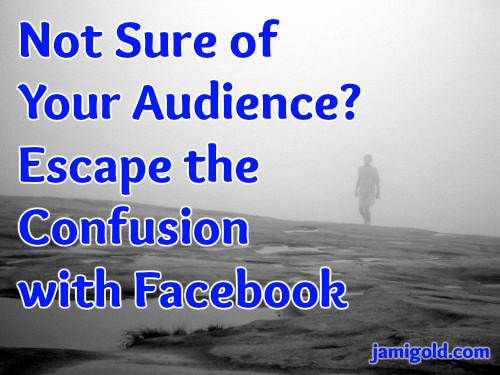Using Facebook to Reach Readers and Sell Books — Guest: Christina Delay

If you hang out on Facebook, chances are you’ve seen advertising on the site. You might have considered—or have already tried—to run Facebook Ads yourself.
However, for every author who’s been successful with Facebook Ads, dozens more have seen their investment disappear with nothing to show for it. There’s a whole host of tricks and tips to make sure we’re reaching the right audience and framing our message correctly.
I’m not much of a Facebook person, so all that advice is like a foreign language to me, but luckily we have Christina Delay here to help. She’s sharing advice on how to learn about our audience and how to reach out to them with our marketing. Yay!
Please welcome Christina Delay! *smile*
*****
Practical Marketing for Authors
How to Set Up Your Facebook Account for Success
by Christina Delay
I’m so thankful to Jami Gold for allowing me to share some practical marketing tips with you today!
In writing circles, we tend to hear a lot about your “author brand” or your “author platform,” which are very important things to pay attention to. Without your brand (aka platform), you don’t have a voice. Without a voice, you can’t reach readers.
But what do you do once you have an author brand? Have you ever felt that you have your brand figured out and it’s all written down in a pretty notebook, but then you get to your computer and feel like you’re entering a black hole?
You’re not alone.
Smart Spending: Don’t Waste Time or Money
Spending money on branding is not a luxury most authors or entrepreneurs can afford. You need to be able to track your marketing dollars, measure the results, and predict where is the best place to put your time and your money.
It’s important to separate those two things. You can spend your time to earn money, and you can spend your money to earn money.
On the flip side, you can also spend your time to lose money, and you spend your money to lose money. That is, if you don’t learn the right places to spend your time and money for the brand you’ve created.
We First Need to Spend Time and Learn
In my role as Cruising Writers hostess, I’ve not only helped authors get connected with agents and editors and their writing tribe, but I’ve also gotten to share marketing tips that I’ve learned along the way.
Before jumping into Facebook Ads, we first need to learn our audience. Click To TweetWhat I’ve noticed after conversations with a lot of authors, is that many don’t know about the cool tools they have access to that allows us to analyze our readership, who we’re actually reaching with our ads and posts, and how to use that data to better reach our readers.
Access to this data helps us skate right around that marketing black hole and use the momentum to become more efficient marketers so we can get back to what we are supposed to be doing—writing!
We can spend time to reach readers, sell books, and better understand our author brand.
Getting Started on Facebook
First, everything in this post assumes that you have an author Facebook page already set up. If you don’t, now’s the time to go do that.
An author Facebook page is different from your personal profile and is useful in a number of ways. In fact, in order for you to gather any sort of data from your readers on Facebook, you must first have an author Facebook page.
Now, let’s talk about a magical marketing tool.
Learn about Our Audience with Pixel Code
I know what you’re thinking. A pixel code sounds like a spy term for torture. It’s not. It’s the most awesome thing ever, and if there’s one thing you do this week for your author business, it should be setting up this code.
What Is It?
It’s a little piece of code that you place on your author website that collects data and allows you to create a Facebook audience to talk to.
Basically, it allows you to find the cross-section of your website visitors and Facebook users and, from there, create an audience.
Want to find your readers on Facebook? Set up a Pixel Code... Click To TweetCan you see the value in that? You’ll be able to talk directly to readers you know have visited your website, who are also on Facebook!
Creating an audience from a Facebook Pixel immediately makes your ads relevant and more effective. It maximizes your Facebook ad dollars, because you are reaching people who already have shown interest in you, where they live. Plus, it helps you maximize your time.
One of my key takeaways from my Facebook Pixel code for Cruising Writers is that 80 percent of people who find me are from direct and Google searches. Only eight percent find me through social media. Which means that I’ve refocused my efforts to produce content on my site versus spending so much time on social media.
Where to Find It?
You can find the Facebook Pixel Code under your Ads Manager.
- Click the Facebook Ads button (with the three horizontal lines to the right of the text) at the top of your screen.
- Under Measure & Report, the 5th option is Pixels. Click that.
- If you don’t see Measure & Report, you may have to click the text at the bottom of the menu that says: All Tools.
- Once you get to the Pixel page, follow the prompts to create your Pixel.
- Either send the Pixel Code with instructions to your website designer to install on your website, or do it yourself.
Collect Information
Let the code simmer for about 30 days. Then come back and create a custom audience on Facebook from your Pixel data.
Voila! You’ve just created a valuable subset of readers to talk to about your books. Pretty cool, right?
Find Our Audience with Facebook Analytics
Once you have your Pixel Code, you can view analytics, which tells you the demographics of who you interact with through your website and through Facebook.
- To find your analytics, go back to the Pixels section of your Ads Manager account.
- Once you get to that page, click on details on the right side of your screen, just above the chart.
And BAM! There you go! Data. Otherwise known as a crystal ball. A true look at who your reader is.
- On the main page of your Pixel data, you’ll be able to see which URLs are most popular and the audiences you’ve built.
- Once you click on View Analytics, you’ll get even more detail, down to the hour of when visitors go to your website or interact with your Facebook page.
Basically, this screen tells you how to set up all of your advertising campaigns. This screen tells you where to spend your time and where to spend your money.
Use the Data to Reach Readers and Sell Books
My favorite three pieces of data from the Pixel Code are:
- Traffic Sources,
- Top Referrer Domains, and,
- Top URLs.
These three pieces tell me where I am most effective with my time and my money.
Traffic Sources
Traffic Sources indicates reader’s internet behaviors.
For one of my recent clients, she believed most people found her through her blog posts and social media. In fact, two-thirds of her readers found her through search engines.
This told us she should focus on SEO. This data point also told us that she retains about 40 percent of visitors who find her through search engines, but that she retains over 80 percent of visitors who directly search for her. Meaning that once a reader visits her site, they stay and come back for more.
Top Referrer Domains
Top Referrer Domains tells how people find you. This data point can also help create your marketing plan for the year, as it’ll guide you to where your readers actually are.
Back to my client, she spent a lot of time on Facebook. Turns out, Facebook was her fifth ranking referrer domain. After Google and Direct Searches, Pinterest took up her third and fourth highest ranking referrer.
You tell me. Should my client continue spending a ton of time on Facebook and letting Pinterest get her scraps? Or should she maybe balance out the time she spends on Facebook with her readers and spend more time investing in her Pinterest audience?
Do you see how this data can help you be more efficient with your time and lead to more book sales because you are connecting with your reader where they are?
Top URLs
Top URLs reveals what your readers are interested in getting from you.
Your five most popular URLs will be listed here, and it can indicate:
- topics you should spend more time writing about,
- genres you write that your readers are interested in (if you are a multi-genre author),
- if your readers are interested in meeting with you face-to-face, or
- if they are even visiting the blog you spend time on.
Top URLs can also indicate the success of a particular promotion.
For example, the page I most promote through guest blogs and social media on Cruising Writers is our Upcoming Writing Retreats page. My retreats change and new retreats are added throughout the year, but this page always stays the same. As a result, it is my most popular URL.
This is a great double-check for your marketing. It tells you either “Your promotions are working, keep going” or “Something’s not right. Change it up.”
Wrapping Up
Not everyone is a natural marketer, and I know plenty of authors who feel like marketing kills their creative soul. If marketing is making you feel like that, then you aren’t doing it right.
With these changes, you’ll get to know your reader better, which will lead to developing a good relationship with them. Then, you’re not marketing. You’re getting to know people and helping them satisfy their needs. Just so happens, you write the type of book that they need.
Go get ’em.
*****
 About Christina Delay:
About Christina Delay:
Christina Delay is the hostess of Cruising Writers and an award-winning author represented by Deidre Knight of The Knight Agency. When she’s not cruising the Caribbean, she’s dreaming up new writing retreats to take talented authors on or writing the stories of the imaginary people that live in her heart.
ChristinaDelay.com | Facebook | Twitter
*****
About Cruising Writers:
Cruising Writers brings aspiring authors together with bestselling authors, an agent, an editor, and a world-renowned writing craft instructor together on writing retreats. Cruise with us to Grand Cayman next October with Kristen Lamb (Bestselling Author and Marketing Jedi), Rachel Caine (Bestselling Author of 50+ books), Deidre Knight (The Knight Agency), and Alex Sehulster (St. Martin’s Press).
CruisingWriters.com | Facebook | Twitter
*****
Thank you, Christina! I’ve long wondered what Facebook’s Pixel Codes are, so I greatly appreciate you explaining what we need to know. Now I’m curious what the results would be for others.
There are many tools and tricks we can use to make publishing and marketing easier—so many that it’s hard to keep track of them all. Good for our goals; bad for our organization. So it’s important for us to share notes in this process.
I love Christina’s point about how if we’ve targeted the right audience, they’ll want to hear from us. They’ll be excited to hear our news of new releases or promotions. No slimy marketing feeling? Bonus! *grin*
Have you tried advertising on Facebook? How did it work for you? Have you set up a Facebook Pixel Code yet (or were you too confused to do so like me)? If so, what did you learn about your audience or traffic? Do you have any questions for Christina?
Pin It

Thanks for having me on today, Jami!
No, I am absolutely not going to use facebook, with their trackers, ads, zombie cookies, click farms and bot networks. What you do is up to you.
Hi Clare,
Fair enough. My aim in bringing Christina here today is to help all those who do want to reach out to their readership on Facebook, but we each have to decide what works for our goals. 🙂
Correct me if I am wrong. Seems you must have a website and a Facebook ad running to use this pixel data.
Hi June! Yes, you need to have an author website, but no, you do not have to run a Facebook ad to use the data. The Pixel code gives you analytics for your website, as well as your author Facebook page, regardless if you run ads or not!
Jami, every time I drop by I learn something new! I’ll be setting up an author Facebook page soon, and a pixel code has been added to my checklist. Christina, thank you for sharing!
Of course! Good luck and have fun digging into the analytics!
Thanks, Jami and Christina for the awesome, helpful article. I found it very helpful and discovered the same thing–most of my people were arriving to me through Google and my website. I recently wanted to start improving my website again and now I feel even more compelled to do so. I’m for sure going to start putting up more blogs again about my progress and things happening with me even if they are simple, it’s better than nothing.
[…] few months ago, Christina Delay shared her tips and insights for how to use Facebook to reach readers and sell books. Today, she’s back again with information on how we can use Google AdWords to remind our […]